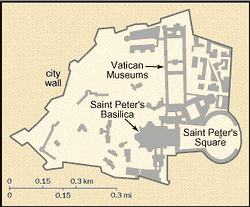|
< Prev 1 2 3 4 5 6 Next >
 |
 |
| Vatican City. |
|
Rome to Regain Control of the World
Vatican City: Its Own Little Country
Back in the 1880's when Ellen White penned her prediction of a revival of the papacy's
world dominance, some found it hard to believe.
The papacy had just been dealt another blow in 1870 when she lost control both of the Papal
States and of the city of Rome itself. Not until Mussolini in 1929 ceded the Vatican to the
papacy did the papacy have its own little country again.
The papacy lost both its supremacy and its temporal power (its sovereign territory)
in 1798. While it has not since regained its supremacy, it did regain its temporal power
in 1800 when a new pope ruled over the papal states. It lost
its territory again in 1809, and regained it again after 1815.
According to papal loyalist Malachi Martin, the situation after that point was
anything but pretty:
|
Between 1823 (death of Pius VII) and 1846 (when
Pius IX was elected), almost 200,000 citizens of the
papal states were severely punished (death, life
imprisonment, exile, galleys) for political offenses;
another 1.5 million were subject to constant police
surveillance and harassment.
There was a gallows permanently in the square of
every town and city and village. Railways, meetings
of more than three people, and all newspapers were
forbidden. All books were censored. A special
tribunal sat permanently in each place to try,
condemn, and execute the accused. All trials were
conducted in Latin. Ninety-nine percent of the
accused did not understand the accusations against
them. Every pope tore up the stream of petitions that
came constantly asking for justice, for the franchise,
for reform of the police and prison system. When
revolts occurred in Bologna, in the Romagna, and
elsewhere, they were put down with wholesale
executions, sentences to lifelong hard labor in the
state penitentiary, to exile, to torture.—Decline
and Fall of the Roman Church, p. 254.
|
Many today think that the old fears back then about the papacy being a threat to freedom
were just anti-Catholic bigotry. Hardly. Even Catholics of the nineteenth century thought
that the papacy was a menace.
The above situation led to the papacy losing its territory once again in 1848,
but it regained it again in 1849. Then it lost it one last time in 1870.
For 59 years, from 1870-1929, the papacy complained
about this loss of territory. Why should it? No other church in the world has
its own little country. Why should the papacy care?
In 1870 multitudes of Catholics thought that the loss of all temporal power
was a good thing. Divested of all civil power, the popes could concentrate on spiritual things
for a change and leave worldly things alone. Why then did the papacy insist on having
its own little country?
The answer concerns a point of papal dogma, and has a direct bearing on the papacy's
plans for
regaining world dominion. The Vatican teaches that the pope replaces Jesus
Christ on earth, and holds on this planet the place of God Almighty. It follows
logically that if you can't tell the Father and the Son what to do, then you
really can't tell the pope what to do either.
But that leaves us with a big problem: If the pope is a mere citizen of a country such as
Italy, then he must be subject to the authorities of Italy
like the Bible commands (Rom. 13:1). However, if he is the head of his own country, then he
answers to no one whatsoever and can do as he pleases. Thus the possession of his own
sovereign state is of vital importance.
Moreover, it serves as a base of international operations that no other church can match.
The fact that the Vatican is considered a sovereign country aids its objective
of exchanging ambassadors with as many nations as possible. It can then through its ambassadors
influence the legislation and policies of the entire globe, more than any other
denomination.
It was in 1867 that the U.S. Congress ceased funding the U.S. diplomatic mission
in Rome, which caused its closure. The reason for the cessation of funding was
that Congress had heard that the papacy had forbidden Protestant religious services
to be conducted in the city of Rome.
In 1939 Franklin Roosevelt began some sort of diplomatic relations with the Vatican by
sending his personal representative. In 1984, Ronald Reagan established formal diplomatic
ties, and regular ambassadors were exchanged between the Church of Rome and Washington.
But the question must be asked, Does the Vatican now allow Protestant worship services
to be freely conducted on its soil? If not, then why were diplomatic ties
ever re-established?
Does the Vatican discriminate on the basis of religion in its hiring practices
for positions in its government? Sure, churches should be allowed to hire only
those of their own persuasion, but for a country to do that seems totally unacceptable.
The U.S. Constitution forbids religious tests for office, and it should.
Because of that provision, Catholics today hold numerous offices at all levels of government.
Should not the Vatican do likewise in the name of religious freedom, and thus
demonstrate that no one has anything to fear about its rapid rise in popularity and
power since 1929?
Arguably, the United States of America is the most powerful nation on the globe today.
And yet not even the president of the United States hosts the pope at the White House.
The president always goes to see the pope at the Vatican or some other agreed place,
but the pope never goes to see the president at his office or home. This sends a
clear message that the pope is the greater of the two, whether that be the truth or not.
< Prev 1 2 3 4 5 6 Next >
|



